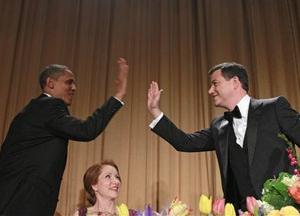High School All Over Again
Washington journalism is like high school It has the same cool kids, mean girls, social rankings and the big prom—the White House Correspondents' Association's annual dinner But unlike what happens in high school, the insular behavior of the Washington media affects the whole nation.
Washington journalism is like high school. It has the same cool kids, mean girls, social rankings and the big prom—the White House Correspondents’ Association’s annual dinner. But unlike what happens in high school, the insular behavior of the Washington media affects the whole nation.
The voice of the cool kids is Mike Allen’s Playbook column on the Politico website, emailed early each morning to addicted readers such as me. The column, interestingly, is titled “POLITICO Playbook, presented by the American Petroleum Institute.” It is a mixture of breaking news, plugs for books by Washington A-list writers and a detailed recitation of weddings, births, job changes, dinner dates, vacations and birthdays of those hot enough to attract Mike’s notice.
Halfway through the column is a word from the apparent sponsor. On Monday, it was: “A message from the American Petroleum Institute: Americans from all walks of life are becoming energy voters. They know America needs more energy from all sources — including domestic oil and natural gas — to create jobs and get our economy moving.”
For those who missed it, the message was repeated at the end.
As someone who labored through the social maze of high school, I can only pity those whose wedding or birthday don’t make Mike’s column. But it gets worse. The mean girls weigh in at Fishbowl DC, a column at the Mediabistro website. Fishbowl sarcastically names those who have fallen from grace or never made it. Then it hounds them, sometimes for days or weeks at a time.
Then there is the annual White House Correspondents’ Association Dinner, where the journalists mingle with their guests, many of them Hollywood celebrities. The guest list becomes more famous every year.
On Monday, I scrolled through The Washington Post website’s coverage of the parties held after the dinner. This is how The Post led off its display of images: “At the 2012 MSNBC and Bloomberg/Vanity Fair after-parties, Hollywood celebrities and Capitol power brokers keep mingling into the night.”
It was sad to see two of my favorite progressive journalists mingling among the celebrities and power brokers. One was David Corn, the Washington bureau chief of Mother Jones; the other, Ari Melber of The Nation. Melber was photographed talking with former New York governor and fallen celebrity Eliot Spitzer. But maybe Melber was just being kind.
Prom night took a real pasting from Tom Brokaw, the distinguished NBC journalist and a founding member of the White House Correspondents’ Association.
“As I’m going around the country a lot of people say to me, ‘What’s happened with the press? What’s happened with political coverage in America? We don’t feel connected to it,’ ” he said Sunday on “Meet the Press.”
“I don’t think the big press event in Washington should be that kind of glittering event where the whole talk is about Cristal champagne, taking over the Italian Embassy, who had the best party, who got to meet the most people,” he said. “That’s another separation between what we’re supposed to be doing and what the people expect us to be doing, and I think that the Washington press corps has to look at that.”
What the people expect is a thorough examination of a nation in crisis. That includes digging into what is happening to poor people denied medical care. What’s it like when you know you, your kid and your spouse are headed for bankruptcy or homelessness, and there’s nothing you can do about it?
What are all those troops going to do in Afghanistan for the next several years? And what about those banks? Bailed out, but they still are reluctant to lend money. If they did, it would help revive the economy. So would corporations putting their growing profits into hiring more workers. Let’s have a report on the job-creating performance of the Fortune 500 companies named Monday.
Make your own list of stories that should be covered, and they’ll be more valid than much of what comes out of Washington.
The White House Correspondents’ Association dinner illustrates why important but difficult stories often don’t make it. Chasing celebrities — or wanting to be a celebrity — has replaced the old practice of chasing news.
Washington coverage once better reflected what is happening to all of the country, instead of the tastes of elite journalists and those who aspire to be elite.
Big Washington bureaus sent journalists around America to report on how Washington actions affected the rest of the nation. Smaller bureaus tracked the activities of lawmakers from their regions and legislation affecting their areas. Strong regional papers did the same in state capitals and city halls and worked with the Washington crew to put out a report more comprehensive than what is available today. This wasn’t glamorous work but the results helped knit the country together.
That has ended, killed by media layoffs and the disappearance of a fighting spirit and a sense of civic responsibility. All we’re left with is prom night.
Your support matters…Independent journalism is under threat and overshadowed by heavily funded mainstream media.
You can help level the playing field. Become a member.
Your tax-deductible contribution keeps us digging beneath the headlines to give you thought-provoking, investigative reporting and analysis that unearths what's really happening- without compromise.
Give today to support our courageous, independent journalists.






You need to be a supporter to comment.
There are currently no responses to this article.
Be the first to respond.